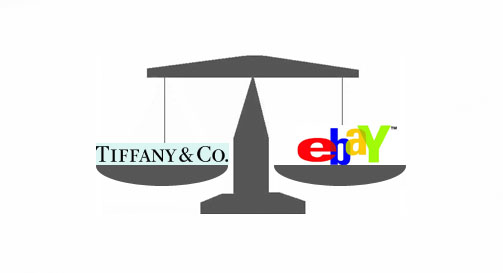It appears that the court has rejected Tiffany’s lawsuit against eBay. Tiffany had argued in the lawsuit that eBay should be held liable for trademark infringement on the basis that significant volumes of silver jewelry merchandise that Tiffany contends are counterfeit have been made available for sale on eBay’s website. As a matter of law, eBay pointed out in its briefing that its proactive measures more than adequately satisfy its legal obligations under U.S. trademark law.
At 9:15am PT today word came down that eBay had indeed won the case over Tiffany. Details are still coming in but for now, I received the following statement from an eBay spokesperson…
“Today’s decision is a victory for consumers. The ruling confirms that eBay acted reasonably and has adequate procedures in place to effectively address counterfeiting. The ruling appropriately establishes that protecting brands and trademarks is the primary burden of rights owners. While today’s decision is a victory for consumer choice, it is a shame that so much effort has been wasted when Tiffany could have worked with eBay to more effectively fight counterfeits. eBay will continue to lead the industry with innovative solutions to stop the sale of counterfeits.”
This is an initial reaction to the ruling. At first glance though, this looks like a best-case scenario for eBay and eBay users. I managed to take a quick look at the 65-page ruling from the Honorable Richard J. Sullivan, District Judge of the US District Court for the Southern District of New York. Here are some tidbits:
“…It is clear that Tiffany and eBay alike have an interest in eliminating counterfeit Tiffany merchandise from eBay – Tiffany to protect its famous brand name, and eBay to preserve the reputation of its website as a safe place to do business…”
“… the court concludes that Tiffany has failed to carry its burden with respect to each claim alleged in the complaint. First, the Court finds that eBay’s use of Tiffany’s trademarks in its advertising… is a protected, nominative fairs use of the marks…”
“Second, the Court finds that eBay is not liable for contributory trademark infringement. In determining whether eBay is liable, the standard is not whether eBay could reasonably anticipate possible infringement, but rather whether eBay continued to supply its services to sellers when it knew or had reason to know of infringement by those sellers…”
“The result of the application of this legal standard is that Tiffany must ultimately bear the burden of protecting its trademark.”
UPDATE: The following public statement was made by eBay at 1:30pm PT
eBay Inc. Applauds Court’s Rejection of Tiffany Counterfeit Claims Court’s ruling reaffirms consumer choice for authentic merchandise San Jose, Calif. — Monday, July 14, 2008 — eBay Inc. (Nasdaq: EBAY; www.ebay.com) today praised a federal judge’s ruling in the Tiffany vs. eBay trademark case, affirming the company’s leading efforts to fight counterfeits and to support consumer choice to buy and sell authentic merchandise online. The U.S. District Court for the Southern District of New York also declared that eBay takes appropriate steps to remove suspected counterfeit listings as part of the company’s additional efforts to provide a safe and trusted marketplace. Furthermore, the court also found that Tiffany was responsible for policing its own trademark on eBay. “We are extremely pleased that this ruling supports consumers by allowing them greater choice and value through the global marketplace that eBay provides,” said Rob Chesnut, senior vice president and legal counsel at eBay. “This decision validates that eBay has always been committed to fighting counterfeits in a way that goes beyond what the law requires. We see this as an important victory for our global community of buyers and sellers.” Counterfeit items are prohibited on eBay. eBay pioneered the fight against counterfeits on the Internet, and its groundbreaking initiative, the Verified Rights Owners program, allows eBay to collaborate with over 18,000 rights owners to help eBay identify and remove counterfeits from the site. “This ruling appropriately established that protecting trademarks is the primary burden of rights owners – not marketplaces like eBay,” Chesnut added. “The court ruled that eBay does in fact meet its responsibilities regarding counterfeits. We aggressively fight counterfeits not only to meet our limited responsibilities, but also because counterfeits hurt the eBay community—the millions of honest sellers building their businesses and buyers who come to eBay for great value and selection. That’s why we want to continue to work with rights owners to aggressively fight the sale of counterfeit items.” The court’s ruling is in line with well established legal precedent which holds that the obligation to enforce trademarks rests with the trademark holder. “The promise of the Internet and companies like eBay has been the ability for entrepreneurs and small businesses to compete with big businesses by having access to a global distribution channel for legal and authentic items,” Chesnut concluded. “We will continue to aggressively protect our marketplace and the innovation and competition it inspires.”
UPDATE: Rob Chesnut talks about the Tiffany ruling:
Cheers, RBH
Related Reads:
– eBay wins counterfeit-sales suit filed by Tiffany
– eBay Claims Victory in the Tiffany Lawsuit
– Judge: Burden of policing eBay for counterfeits is Tiffany’s
– Federal Judge: eBay Doesn’t Have To Ferret Out Trademark Infringers
– eBay v. Tiffany: 4 years later, eBay wins
– eBay Wins Tiffany Case Over Counterfeit Goods


